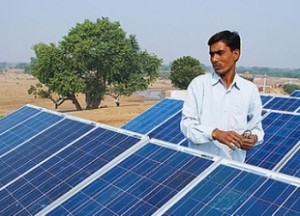General Electric Capitulation is a bad portend for First Solar
August 12, 20132 Secular Tailwinds for Wind Energy in India despite Bumps
August 13, 2013Solar energy in India has been driven by subsidies given by the central and state governments. However, the sharp 
AP is highly power deficient like other southern states in India which are not connected to the national grid. Massive governance and regulatory problems have led to a situation where power deficiency in these states has reached 30%. Solar power has become cheap enough for industries to opt for such plants on their own merit. It is possible to generate solar power at Rs 6-7/ Kwh which is comparable to the retail prices today. Solar power has an added advantage that they are reliable and under your own control. Diesel gensets are not only hugely polluting but have become very expensive, with rupee depreciation and sharp increase in the price of crude oil.
Also transporting massive amounts of diesel everyday to fill up the gensets is a logistical and costly issue. I think that solar power is going to see increasing adoption by corporate, looking for a reliable source of power whose costs does no escalate with time. Solar power has reached the tipping point where it can compete with fossil fuels in a large number of places. I expect that solar demand will continue to increase at 20% in the next 5 years globally.
Also subscribe to our e-book ‘Free Guide on SOLAR ENERGY IN INDIA‘.
